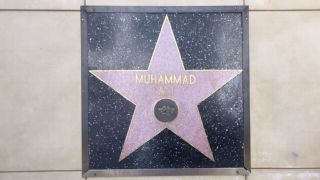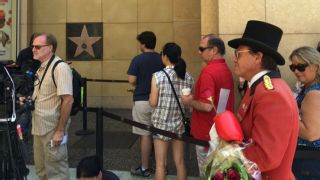|
LOS ANGELES -- I've lived in Los Angeles for most of my life, but I never paid much attention to the Hollywood Walk of Fame. The idea of kneeling down in the middle of a bustling sidewalk and taking a picture of a celebrity's name etched into the ground as people bump into me never seemed that appealing. But there was always one star and one story I've loved among the 2,500 stars that line the sidewalks of that 15-block stretch in Hollywood. There was only one star that had never been walked on. Muhammad Ali's star is the only star that is not on the ground for millions of tourists and bootleg-costumed superheroes to carelessly walk over. Instead, it's mounted on a wall next to the Walk of Fame, just inside the Dolby Theatre -- the home of the Academy Awards. Ali had originally declined an invitation from the Hollywood Chamber of Commerce to get a star, because he didn't want his name and what it represented disrespected by having it walked on by "people who have no respect for me."  "I bear the name of our beloved prophet Mohammad, and it is impossible that I allow people to trample over his name," he said at the time. The Hollywood Chamber of Commerce respected Ali's wishes and decided that the 2,189th star would be the first and (so far) only star mounted on a wall. Of all the true Hollywood stories told over the years, the story behind Ali's star is my favorite, for what it represented. It isn't easy being a Muslim in the United States for reasons that go far deeper and extend much further than the opinions of a certain presidential candidate this year, and Ali made it easier to be a Muslim in a country that has never really viewed the religion favorably. Ali wasn't just the greatest athlete of all time, but he was also the most famous Muslim -- and that last part shouldn't be forgotten. It certainly wasn't by my father, Ali, and his brother, Mohammad, who came to the United States in 1972 without knowing much English outside of memorizing the lyrics to Billy Paul's "Me and Mrs. Jones." Muhammad Ali made their names and their religion more acceptable than it otherwise would have been. If others could accept and love Ali, maybe they could do the same for them, they thought. Of course, that wasn't always the case. "I wish people would love everybody else the way they love me," Ali once said. "It would be a better world."  My father would tell me stories about watching Ali fights on television in Iran, and I can still vividly remember seeing that famous Neil Leifer photo of Ali standing over Sonny Liston at a convenience store in Istanbul as a child. I asked my grandfather who that was, and he smiled with pride as if he was talking about one of his own sons when he said in Farsi, "That is Muhammad Ali. He was the greatest." His photo hung in other stores and homes in the Middle East, from Turkey to Iran to Dubai, like some kind of mythical figure years after he had retired. He was born Cassius Clay, but his conversion to Islam in 1964 made him a beloved figure in parts of the world that would have never thought to accept a grandson of a slave from Louisville, Kentucky, as one of their own. It was never harder being a Muslim than after Sept. 11, 2001. Islam was no longer thought of as a religion, but as a terrorist group of radical followers. It was Ali who took it upon himself to stand up and speak out, during a time when Parkinson's had made it hard for him to do either. "Islam is a religion of peace. It does not promote terrorism or killing people," Ali said. "People say a Muslim caused this destruction. I am angry that the world sees a certain group of Islam followers who caused this destruction, but they are not real Muslims. They are racist fanatics who call themselves Muslims, permitting this murder of thousands." His view on religion was classic Ali as he broke down a hotly debated topic into a perfect sound bite. "Rivers, ponds, lakes and streams," he said. "They have different names, but all contain water. Religions have different names but all contain truth." When I woke up Saturday morning, I felt the need to drive to Ali's Hollywood Walk of Fame Star. I stood in line with other fans who had made the trip to pay their respects, take a picture and leave behind flowers and other mementos. I had taken family members by that star when they visited from Iran, Dubai, Turkey and other parts of the Middle East. They were always so proud -- not because Ali had a star, but because of the story behind his star hanging on the wall instead of it being on the ground. It gave the star greater meaning, and it gave others a better understanding of what his name and religion really meant. In other words, it was quintessential Ali.
|
